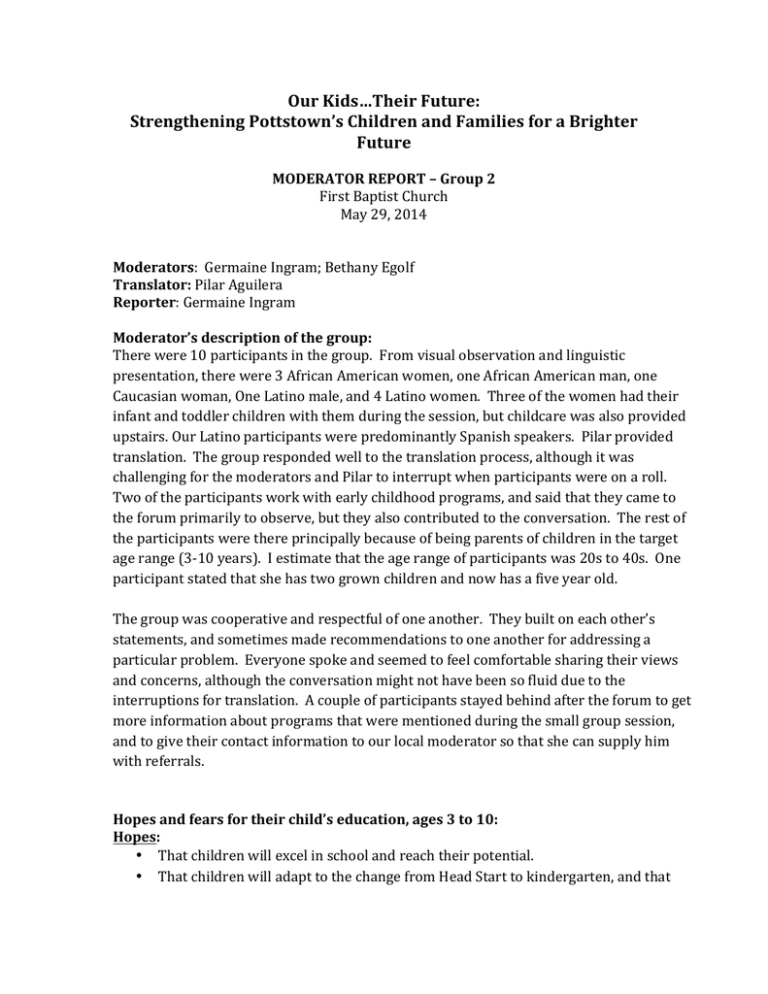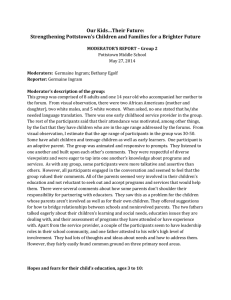Document 14559619
advertisement

Our Kids…Their Future: Strengthening Pottstown’s Children and Families for a Brighter Future MODERATOR REPORT – Group 2 First Baptist Church May 29, 2014 Moderators: Germaine Ingram; Bethany Egolf Translator: Pilar Aguilera Reporter: Germaine Ingram Moderator’s description of the group: There were 10 participants in the group. From visual observation and linguistic presentation, there were 3 African American women, one African American man, one Caucasian woman, One Latino male, and 4 Latino women. Three of the women had their infant and toddler children with them during the session, but childcare was also provided upstairs. Our Latino participants were predominantly Spanish speakers. Pilar provided translation. The group responded well to the translation process, although it was challenging for the moderators and Pilar to interrupt when participants were on a roll. Two of the participants work with early childhood programs, and said that they came to the forum primarily to observe, but they also contributed to the conversation. The rest of the participants were there principally because of being parents of children in the target age range (3-­‐10 years). I estimate that the age range of participants was 20s to 40s. One participant stated that she has two grown children and now has a five year old. The group was cooperative and respectful of one another. They built on each other’s statements, and sometimes made recommendations to one another for addressing a particular problem. Everyone spoke and seemed to feel comfortable sharing their views and concerns, although the conversation might not have been so fluid due to the interruptions for translation. A couple of participants stayed behind after the forum to get more information about programs that were mentioned during the small group session, and to give their contact information to our local moderator so that she can supply him with referrals. Hopes and fears for their child’s education, ages 3 to 10: Hopes: • That children will excel in school and reach their potential. • That children will adapt to the change from Head Start to kindergarten, and that • • • • • • • they will continue to get therapeutic support for speech challenges. That there will be improved security at the Lincoln School and more protection against weapons being brought into the school. That district decisions about grade organization will be sensitive to the need to “let children stay children,” and that middle years students not be exposed too early to behaviors and peer pressure from older kids. o This comment was especially related to the district’s decision to move fifth grade from elementary school to middle school. More parental involvement More support for children in reading; an evaluation to determine if children are dyslexic. Programs and training for kids and parents related to building empathy and social skills. More resources (e.g. tutoring, extended school year, recreational activities) forchildren, especially those with learning and behavioral challenges. Spanish translation services at schools. It is especially difficult when children have to translate for the teacher and the school nurse. Fears: • That security problems at the Lincoln School won’t be addressed; more people are needed to monitor visitors once they get past the front door. • Violence in schools o One participant expressed concern about recent killings, although they did not seem to have occurred in schools. • Decision of district to put 5th graders in middle school will expose vulnerable kids to peer pressure and bad influences from older kids. • Bullying in general and a concern that communities aren’t doing what they can to convey support and concern about the problem. • That children won’t succeed in school. Programs: We asked participants to review the list of Pottstown ECE programs that have been offered and to speak to those they have participated in. What made these programs positive experiences for their families? In what ways could these programs be improved? • Parent Education Programs: The parent of a 5 year old said that these programs have been very helpful to her learning about child rearing today, as compared to when she raised her adult children. Subject matter has changed, especially the teaching of math, and parents are at a loss to understand the math concepts and help their children with their homework. One participant said she sees volunteering as a good means of learning about current education programs and strategies. • Head Start: One participant had great praise for Head Start. Her son is making good progress in learning English; he is getting speech therapy that he needs; she felt supported by good translation services. • Participants identified three programs that they think are doing an especially good job in communicating with parents: CCIS, Early Head Start, ACLAMO. Other programs can look to these for ideas and strategies. Needs and Barriers : • Classes are too large for teachers to be able to do their best for children; Reduce Class Sizes • Parents don’t know where to go to get individualized help for their children; Provide more resources and programs for parents of children who have special needs or need extra help. (Holcomb Behavioral Health was suggested by one participant to another participant who is looking for options for one of his sons.) • Parents aren’t aware of services, events, and opportunities, and experience barriers to their involvement; Provide better communications and outreach to encourage and support parental involvement. Things that can be done to address this need are: o Programs like “Mommy & Me”, that work with parents and children together o Outreach to parents following school closures and grade reorganizations to help parents feel welcome and valued in their new school. o More support for affordable childcare o Schedule programs at times convenient for single parents, working parents, and parents with several children. o Translate announcements and materials into Spanish; Have Spanish language interpreters and translators at meetings and events. o Locate programs in places that are accessible to families; recognize the transportation challenges families face and concerns about walking home at night. One suggestion was to look to local businesses to host programs at their locations. Final synthesis of qualities, values, characteristics Common Ground/Key Ideas • Improve security in schools; make parents and children feel safe. • More supportive options and resources, such as tutoring services, counseling, affordable summer and after school programs. • Improve communications with parents. Translation services are critical. Also make information about opportunities and resources more easily accessible to parents.




